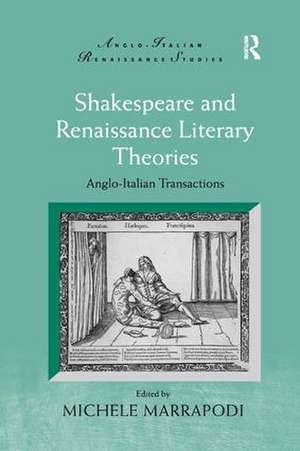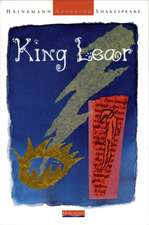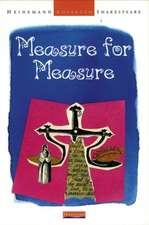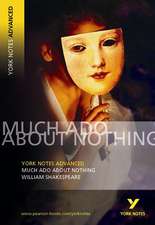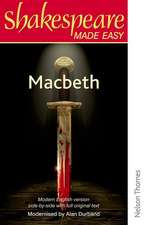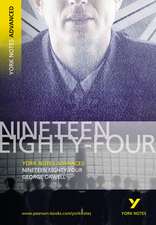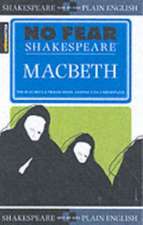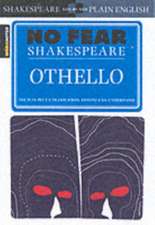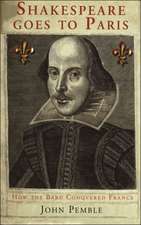Shakespeare and Renaissance Literary Theories: Anglo-Italian Transactions: Anglo-Italian Renaissance Studies
Editat de Michele Marrapodien Limba Engleză Paperback – 17 noi 2016
| Toate formatele și edițiile | Preț | Express |
|---|---|---|
| Paperback (1) | 469.34 lei 6-8 săpt. | |
| Taylor & Francis – 17 noi 2016 | 469.34 lei 6-8 săpt. | |
| Hardback (1) | 1065.78 lei 6-8 săpt. | |
| Taylor & Francis – 18 mar 2011 | 1065.78 lei 6-8 săpt. |
Din seria Anglo-Italian Renaissance Studies
-
 Preț: 153.08 lei
Preț: 153.08 lei -
 Preț: 469.34 lei
Preț: 469.34 lei -
 Preț: 434.50 lei
Preț: 434.50 lei - 13%
 Preț: 338.33 lei
Preț: 338.33 lei -
 Preț: 483.55 lei
Preț: 483.55 lei -
 Preț: 469.34 lei
Preț: 469.34 lei -
 Preț: 489.26 lei
Preț: 489.26 lei -
 Preț: 462.85 lei
Preț: 462.85 lei - 16%
 Preț: 261.33 lei
Preț: 261.33 lei -
 Preț: 469.34 lei
Preț: 469.34 lei -
 Preț: 389.66 lei
Preț: 389.66 lei - 13%
 Preț: 335.67 lei
Preț: 335.67 lei -
 Preț: 389.38 lei
Preț: 389.38 lei -
 Preț: 406.58 lei
Preț: 406.58 lei - 17%
 Preț: 257.28 lei
Preț: 257.28 lei -
 Preț: 413.33 lei
Preț: 413.33 lei - 15%
 Preț: 266.61 lei
Preț: 266.61 lei -
 Preț: 382.91 lei
Preț: 382.91 lei -
 Preț: 389.66 lei
Preț: 389.66 lei - 9%
 Preț: 1037.81 lei
Preț: 1037.81 lei - 18%
 Preț: 1001.70 lei
Preț: 1001.70 lei - 18%
 Preț: 1110.92 lei
Preț: 1110.92 lei -
 Preț: 393.35 lei
Preț: 393.35 lei - 18%
 Preț: 1115.21 lei
Preț: 1115.21 lei - 18%
 Preț: 1001.87 lei
Preț: 1001.87 lei - 9%
 Preț: 938.18 lei
Preț: 938.18 lei - 18%
 Preț: 999.51 lei
Preț: 999.51 lei -
 Preț: 310.81 lei
Preț: 310.81 lei
Preț: 469.34 lei
Nou
Puncte Express: 704
Preț estimativ în valută:
89.81€ • 93.96$ • 74.60£
89.81€ • 93.96$ • 74.60£
Carte tipărită la comandă
Livrare economică 03-17 aprilie
Preluare comenzi: 021 569.72.76
Specificații
ISBN-13: 9781138268517
ISBN-10: 1138268518
Pagini: 340
Dimensiuni: 156 x 234 mm
Greutate: 0.45 kg
Ediția:1
Editura: Taylor & Francis
Colecția Routledge
Seria Anglo-Italian Renaissance Studies
Locul publicării:Oxford, United Kingdom
ISBN-10: 1138268518
Pagini: 340
Dimensiuni: 156 x 234 mm
Greutate: 0.45 kg
Ediția:1
Editura: Taylor & Francis
Colecția Routledge
Seria Anglo-Italian Renaissance Studies
Locul publicării:Oxford, United Kingdom
Notă biografică
Michele Marrapodi is Full Professor of English Language and Literature, and History of English Drama, in the Faculty of Arts at the University of Palermo, Italy.
Recenzii
'... [a] valuable collection...'Journal of Anglo-Italian Studies 'Marrapodi judiciously allows his contributors to range widely. The book demonstrates how the field of Anglo-Italian studies is in contact with many other areas of current research. In a book that is itself so concerned with intertexts and intellectual matrives, Marrapodi rightly strives for, and achieves, a sense of diffusion.' Renaissance Quarterly
Cuprins
Introduction Shakespeare against Genres; I: Art, Rhetoric, Style; 1: Sheakespeare and the Art of Forgetting; 2: Shakespearean Comedy: Postmodern Theory and Humanist Poetics; 3: Shakespeare: What Rhetoric Accomplishes; 4: Shakespearean Outdoings: Titus Andronicus and Italian Renaissance Tragedy; 5: Transalpine Wonders: Shakespeare's Marvelous Aesthetics; II: Genres, Models, Forms; 6: Hamlet versus Commedia dell'Arte; 7: The End of Shakespeare's Machiavellian Moment: Julius Caesar, Shakespeare's Historiography, and Dramatic Form; 8: The Problem of Old Age: Anticomedy in As You Like It and Ruzante's L'Anconitana; 9: Ruzante and Shakespeare: A Comparative Case-Study; 10: The ‘Woman as Wonder' Trope: From Commedia Grave to Shakespeare's Pericles and the Last Plays; III: Spectacle, Aesthetics, Representation; 11: Shakespeare's Italian Carnival: Venice and Verona Revisited; 12: (Re)fracted Art and Ordered Nature: Italian Renaissance Aesthetics in Shakespeare's Richard II; 13: 'Tis Pity She's Italian: Performing the Courtesan on the Early Seventeenth-Century English Stage; 14: Silence, Seeing, and Performativity: Shakespeare and the Paragone; 15: Italian Spectacle and the Worlds of James VI/I; IV: Coda; 16: How Do We Know When Worlds Meet?
Descriere
Throwing fresh light on a much discussed but still controversial field, this collection of essays places the presence of Italian literary theories against and alongside the background of English dramatic traditions, to assess this influence in the emergence of Elizabethan theatrical convention and the innovative dramatic practices under the early Stuarts.
